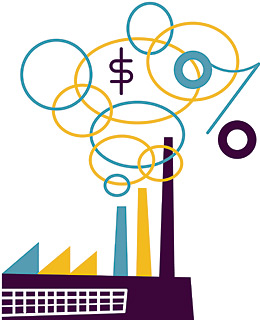
It was May Day here in Ontario. I just Tweeted about a program I saw on TVO with socialism as a theme with Ontario NDP leader, Andrea Horwath, and political scientist at York University, Leo Panitch.
The discussions were interesting, but what really stuck with me was whether or not good politicians follow the votes or get the electorate to see things differently. For example, given the anti-corporate climate, will politicians pander to where they think the electorate is or will they try to shape thinking about the economy?
Sell the sizzle, not the steak
In a shameless attempt to drive more pageviews, I included a pic. and cartoon of Ségolène Royal {Ségolène is a ThickCulture crowd-pleaser, according to our Google Analytics}, a French socialist {Parti Socialiste, PS} centre-left politician who ran for President in 2007 {losing to Sarkozy} and may run in 2012. Say what you will about Ségolène, she manages to capture attention. She has been known to have a quirky, evangelical style and has been accused by some as having a Joan of Arc complex. Well, this sounds familiar (see Glenn Beck video from last fall).
The comparison isn’t accidental. Obama with his power of persuasion, thus far, and the state of the economy may be providing a perfect storm for a change in the political zeitgeist. Will the Democrats see this as an opportunity to embrace that dreaded third-rail word, socialism, in terms of either rhetoric or implemented policy -or- would that just bring about a Gingrichian revolt akin to 1994? Change? What kind of change? New Deal change? New Frontier change? Great Society change? Is it a matter of the public looking for it -or- will savvy politicians frame a “new” economic order for them? I think we’re in for seeing plenty of sizzle sold, but at some point, steak will have to be on the table, specifically, in terms of economic recovery.
The upcoming election in British Columbia is pitting the centre-left (NDP) versus the centre-right (BC Liberal) {e.g., see blog on the BC Carbon Tax issue}, where the centre-left has a shot of controlling the provincial government. Nationwide, the NDP support has risen 1 point since December to 13%, while the Liberals and Tories swapped positions and are polling 36 and 33%, respectively. Perhaps regionally, there may a shift to the left {Canada has had NDP provincial governments in the past}, but I wonder as joblessness continues and bailouts persist, will national-scene politics in Canada and the US move towards a more socialist agenda? While Barack is far from a socialist, he’s gaining comfort in his centre-left stance::
“The economic philosophy that Mr. Obama developed during the presidential campaign drew from across the ideological spectrum even as it remained rooted on the center-left. As that philosophy has been tested in practice through his early months in office, the president has if anything become more comfortable with an occasionally intrusive government as a counterweight to market forces that are now so powerful and fast-moving that they cannot be counted on to be self-correcting when things go wrong.”
–“Obamanomics: Redefining Capitalism After the Fall,” NYT, Richard W. Stevenson
So, are you ready for some socialism? Will we see the selling of socialism? Sounds like an oxymoron, but it may be a matter of time before we see something like this. What’s Springsteen up to this summer?
I welcome any and all thoughts.
OK Ségo fans, while not entirely flattering, the following cartoon should help you with your fix.

Twitterversion:: EpicFail for capitalism? Given current econ & political climate, is US/Canada ready for socialism? Will politicns pander or reshape thinkng?
Song::




 .
.


